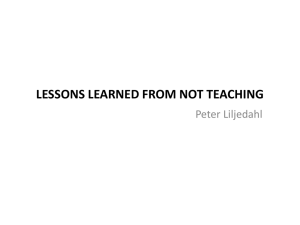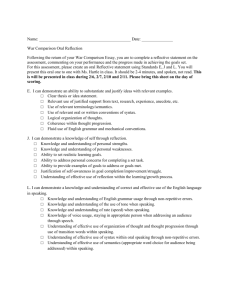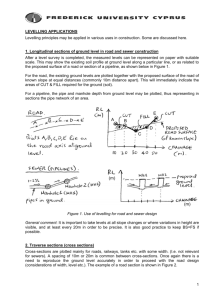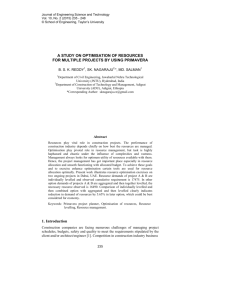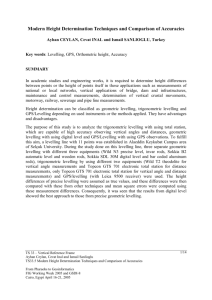The Present Age - cliffarnold.com
advertisement
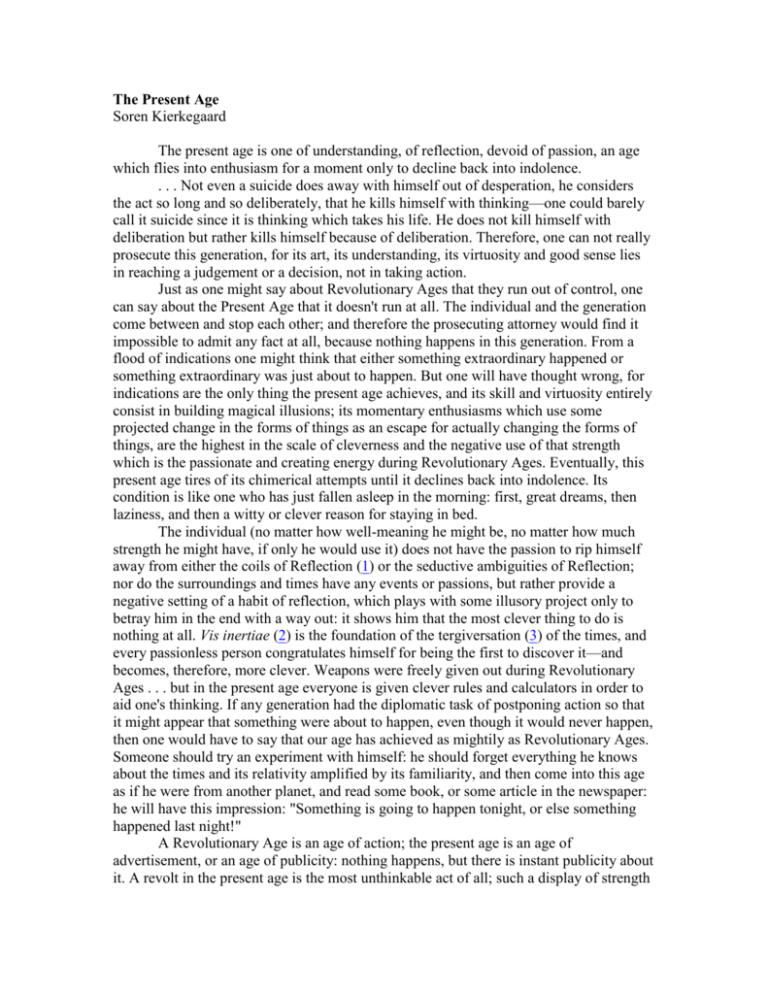
The Present Age Soren Kierkegaard The present age is one of understanding, of reflection, devoid of passion, an age which flies into enthusiasm for a moment only to decline back into indolence. . . . Not even a suicide does away with himself out of desperation, he considers the act so long and so deliberately, that he kills himself with thinking—one could barely call it suicide since it is thinking which takes his life. He does not kill himself with deliberation but rather kills himself because of deliberation. Therefore, one can not really prosecute this generation, for its art, its understanding, its virtuosity and good sense lies in reaching a judgement or a decision, not in taking action. Just as one might say about Revolutionary Ages that they run out of control, one can say about the Present Age that it doesn't run at all. The individual and the generation come between and stop each other; and therefore the prosecuting attorney would find it impossible to admit any fact at all, because nothing happens in this generation. From a flood of indications one might think that either something extraordinary happened or something extraordinary was just about to happen. But one will have thought wrong, for indications are the only thing the present age achieves, and its skill and virtuosity entirely consist in building magical illusions; its momentary enthusiasms which use some projected change in the forms of things as an escape for actually changing the forms of things, are the highest in the scale of cleverness and the negative use of that strength which is the passionate and creating energy during Revolutionary Ages. Eventually, this present age tires of its chimerical attempts until it declines back into indolence. Its condition is like one who has just fallen asleep in the morning: first, great dreams, then laziness, and then a witty or clever reason for staying in bed. The individual (no matter how well-meaning he might be, no matter how much strength he might have, if only he would use it) does not have the passion to rip himself away from either the coils of Reflection (1) or the seductive ambiguities of Reflection; nor do the surroundings and times have any events or passions, but rather provide a negative setting of a habit of reflection, which plays with some illusory project only to betray him in the end with a way out: it shows him that the most clever thing to do is nothing at all. Vis inertiae (2) is the foundation of the tergiversation (3) of the times, and every passionless person congratulates himself for being the first to discover it—and becomes, therefore, more clever. Weapons were freely given out during Revolutionary Ages . . . but in the present age everyone is given clever rules and calculators in order to aid one's thinking. If any generation had the diplomatic task of postponing action so that it might appear that something were about to happen, even though it would never happen, then one would have to say that our age has achieved as mightily as Revolutionary Ages. Someone should try an experiment with himself: he should forget everything he knows about the times and its relativity amplified by its familiarity, and then come into this age as if he were from another planet, and read some book, or some article in the newspaper: he will have this impression: "Something is going to happen tonight, or else something happened last night!" A Revolutionary Age is an age of action; the present age is an age of advertisement, or an age of publicity: nothing happens, but there is instant publicity about it. A revolt in the present age is the most unthinkable act of all; such a display of strength would confuse the calculating cleverness of the times. Nevertheless, some political virtuoso might achieve something nearly as great. He would write some manifesto or other which calls for a General Assembly in order to decide on a revolution, and he would write it so carefully that even the Censor himself would pass on it; and at the General Assembly he would manage to bring it about that the audience believed that it had actually rebelled, and then everyone would placidly go home—after they had spent a very nice evening out. An enormous grounding in scholarship is alien to the youth of today, in fact, they would find it laughable. Nevertheless, some scientific virtuoso might achieve something even greater. He would draw up some prospectus outlining systematically some all-embracing, all-explaining system that he was about to write, and he would manage to achieve the feat of convincing the reader (of the prospectus) that he had in fact read the entire system. The Age of Encyclopedists is gone, when with great pains men wrote large Folios; now we have an age of intellectual tourists, small little encyclopedists, who, here and there, deal with all sciences and all existence. And a genuine religious rejection of the world, followed with constant self-denial, is equally unthinkable among the youth of our time: nevertheless, some bible college student has the virtuosity to achieve something even greater. He could design some projected group or Society which aims to save those who are lost. The age of great achievers is gone, the present age is an age of anticipators. . . . Like a youth who plans to diligently study from September 1 for an exam, and in order to solidify his resolve takes a holiday for the entire month of August, such is our generation which has decided resolutely that the next generation will work very hard, and in order not to interfere with or delay the next generation, this generation diligently—goes to parties. However, there is one difference in this comparison: the youth understands that he is light-hearted, the present age is on the contrary very serious—even at their parties. Action and passion is as absent in the present age as peril is absent from swimming in shallow waters. . . . If a precious jewel, which all desired, lay out on a frozen lake, where the ice was perilously thin, where death threatened one who went out too far while the ice near the shore was safe, in a passionate age the crowds would cheer the courage of the man who went out on the ice; they would fear for him and with him in his resolute action; they would sorrow over him if he went under; they would consider him divine if he returned with the jewel. In this passionless, reflective age, things would be different. People would think themselves very intelligent in figuring out the foolishness and worthlessness of going out on the ice, indeed, that it would be incomprehensible and laughable; and thereby they would transform passionate daring into a display of skill . . . . The people would go and watch from safety and the connoisseurs with their discerning tastes would carefully judge the skilled skater, who would go almost to the edge (that is, as far as the ice was safe, and would not go beyond this point) and then swing back. The most skilled skaters would go out the furthest and venture most dangerously, in order to make the crowds gasp and say: "Gods! He is insane, he will kill himself!" But you will see that his skill is so perfected that he will at the right moment swing around while the ice is still safe and his life is not endangered. . . . Men, then, only desire money, and money is an abstraction, a form of reflection . . . Men do not envy the gifts of others, their skill, or the love of their women; they only envy each others' money. . . . These men would die with nothing to repent of, believing that if only they had the money, they might have truly lived and truly achieved something. The established order continues, but our reflection and passionlessness finds its satisfaction in ambiguity. No person wishes to destroy the power of the king, but if little by little it can be reduced to nothing but a fiction, then everyone would cheer the king. No person wishes to pull down the pre-eminent, but if at the same time pre-eminence could be demonstrated to be a fiction, then everyone would be happy. No person wishes to abandon Christian terminology, but they can secretly change it so that it doesn't require decision or action. And so they are unrepentant, since they have not pulled down anything. People do not desire any more to have a strong king than they do a heroliberator than they do religious authority, for they innocently wish the established order to continue, but in a reflective way they more or less know that the established order no longer continues. . . . The reflective tension this creates constitutes itself into a new principle, and just as in an age of passion enthusiasm is the unifying principle, so in a passionless age of reflection envy (misundelse) (4) is the negative-unifying principle. This must not be understood as a moral term, but rather, the idea of reflection, as it were, is envy, and envy is therefore twofold: it is selfish in the individual and in the society around him. The envy of reflection in the individual hinders any passionate decision he might make; and if he wishes to free himself from reflection, the reflection of society around him re-captures him. . . . Envy (misundelse) constitutes the principle of characterlessness, which from its misery sneaks up until it arrives at some position, and it protects itself with the concession that it is nothing. The envy of characterlessness never understands that distinction is really a distinction, nor does it understand itself in recognizing distinction negatively, (5) but rather reduces it so that it is no longer distinction; and envy defends itself not only from distinction, but against that distinction which is to come. (6) Envy which is establishing itself is a levelling, (7) and while a passionate age pushes forward, establishing new things and destroying others, raising and tearing down, a reflective, passionless age does the opposite, it stifles and hinders, it levels. This levelling is a silent, mathematical, abstract process which avoids upheavals. . . . Levelling at its maximum is like the stillness of death, where one can hear one's own heartbeat, a stillness like death, into which nothing can penetrate, in which everything sinks, powerless. One person can head a rebellion, but one person cannot head this levelling process, for that would make him a leader and he would avoid being levelled. Each individual can in his little circle participate in this levelling, but it is an abstract process, and levelling is abstraction conquering individuality. The levelling in modern times is the reflective equivalent of fate in the ancient times. The dialectic of ancient times tended towards leadership (the great man over the masses and the free man over the slave); the dialectic of Christianity tends, at least until now, towards representation (the majority views itself in the representative, and is liberated in the knowledge that it is represented in that representative, in a kind of self-knowledge); the dialectic of the present age tends towards equality, and its most consequent but false result is levelling, as the negative unity of the negative relationship between individuals. Everyone should see now that levelling has a fundamental meaning: the category of "generation" supersedes the category of the "individual." During ancient times the mass of individuals had this value: that it made valuable the outstanding individual. . . . In ancient times, the single individual in the masses signified nothing; the outstanding individual signified them all. In the present age, the tendency is towards a mathematical equality . . . In order for levelling really to occur, first it is necessary to bring a phantom into existence, a spirit of levelling, a huge abstraction, an all-embracing something that is nothing, an illusion—the phantom of the public. . . . The public is the real LevellingMaster, rather than the leveller itself, for levelling is done by something, and the public is a huge nothing. The public is an idea, which would never have occurred to people in ancient times, for the people themselves en masse in corpora (8) took steps in any active situation, and bore responsibility for each individual among them, and each individual had to personally, without fail, present himself and submit his decision immediately to approval or disapproval. When first a clever society makes concrete reality into nothing, then the Media (9) creates that abstraction, "the public," which is filled with unreal individuals, who are never united nor can they ever unite simultaneously in a single situation or organization, yet still stick together as a whole. The public is a body, more numerous than the people which compose it, but this body can never be shown, indeed it can never have only a single representation, because it is an abstraction. Yet this public becomes larger, the more the times become passionless and reflective and destroy concrete reality; this whole, the public, soon embraces everything. . . . The public is not a people, it is not a generation, it is not a simultaneity, it is not a community, it is not a society, it is not an association, it is not those particular men over there, because all these exist because they are concrete and real; however, no single individual who belongs to the public has any real commitment; some times during the day he belongs to the public, namely, in those times in which he is nothing; in those times that he is a particular person, he does not belong to the public. Consisting of such individuals, who as individuals are nothing, the public becomes a huge something, a nothing, an abstract desert and emptiness, which is everything and nothing. . . . The Media is an abstraction (because a newspaper is not concrete and only in an abstract sense can be considered an individual), which in association with the passionlessness and reflection of the times creates that abstract phantom, the public, which is the actual leveller. . . . More and more individuals will, because of their indolent bloodlessness, aspire to become nothing, in order to become the public, this abstract whole, which forms in this ridiculous manner: the public comes into existence because all its participants become third parties. (10) This lazy mass, which understands nothing and does nothing, this public gallery seeks some distraction, and soon gives itself over to the idea that everything which someone does, or achieves, has been done to provide the public something to gossip about. . . . The public has a dog for its amusement. That dog is the Media. (11) If there is someone better than the public, someone who distinguishes himself, the public sets the dog on him and all the amusement begins. This biting dog tears up his coat-tails, and takes all sort of vulgar liberties with his leg—until the public bores of it all and calls the dog off. That is how the public levels. Translated from the Danish by Richard Hooker Endnotes 1 This word has two meanings in Kierkegaard: 1.) reflection as "thinking," "deliberation," as opposed to acting and doing; 2.) most importantly, reflection as "reflection," that is, becoming a kind of mirror in which you derive your individuality from imitating the people around you. In Rousseau, modern society was characterized by people getting their identity entirely from the opinions of others; in Kierkegaard, reflection is a matter of getting your identity solely by imitating others. This gives rise to "the public." 2 The way of inertia. 3 "Evasion," "recusal." 4 Besides "envy," etymologically misundelse means "contrariness" or "spite." This is very similar to Nietzsche's ressentiment . 5 That is, it does not understand the exceptional in a positive sense as being better than itself nor does it understand the exceptional in a negative sense as being worse than itself. 6 The Final Judgement. 7 That is, it flattens everything to the same level; nothing is below this level, nothing is above this level. 8 "In mass, in a single body" 9 Danish Pressen , "the press," which in contemporary English is called "the media." 10 That is, viewers, onlookers, people who watch what happens rather than makes anything happen. 11 Danish: den literaire Foragtelighed , literally, the literary scandal sheets; what we would call "tabloids."

